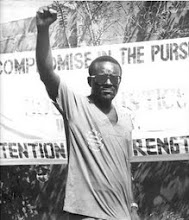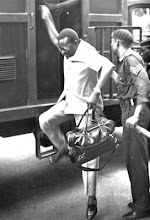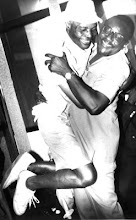At Gani Fawehinmi’s Oka, Ondo town home on Wednesday morning, the day following his interment, a lot had changed. The surging crowd was gone, and so were the canopies that shielded them from the elements. The frenzied photographers who, barely 24 hours earlier, had turned the graveside into a camp had all departed. The DAAR Communications Outside Broadcasting (OB) Van that for a few days became a part of the landscape was gone. Only a group of workmen remained, cleaning up.
And then there were the banners bearing Gani’s images - a good number of them prison photos.
And then there were the banners bearing Gani’s images - a good number of them prison photos.

The four slabs that covered the grave had been sealed into place with concrete, and all that kept the site company were the wreaths from the day before. Nearby, Gani’s mother’s marble tomb bore the footprints of the crowd that had gathered to bid farewell to her son. The inscription engraved onto it revealed that the son died exactly six years to the day the mother was buried - September 5, 2003.
Just outside the entrance to the house sat Gani’s younger brother, Olumide, eager to share reminiscences. “He was my very, very good friend. We were so close... the love I had for him, that was why I had to name my first son, Gani Fawehinmi... he has even promised to be a lawyer. All my children - I have two boys and a girl - are so fond of him.
“And I know my children will be the ones that will miss him (most), because most weekends they will say ‘My daddy, let’s go to Baba’, but now there’s no Baba...”
Much has been said of Gani’s “payroll” - the startling number of people who monthly benefited from him in cash. Olumide Fawehinmi gave an idea of the size of the “payroll”.
“Everybody, quote me, everybody in (the) family house, they are on Chief Gani Fawehinmi’s payroll... those that are on his payroll in this town alone, they’re over 200. As I’m talking to you, I’m a successful businessman, (but) I’m on his payroll. He doesn’t look at whether you are successful. There was a time he told me, (about) 15 years ago, he said ‘Olumide, if not for the way this country is, I will just tell all the family to stop working ...” Even Olumide’s children were on the payroll as well. “All of them. My last born, who’s a girl, will be three years old by November, and she’s on the payroll of Chief...”
Loads of memories
Civil Engineer, Gregory Odunwo, did construction work (“finishing”) at Gani’s Ikeja residence, as well as the late lawyer’s Gallery at the Central Business District, Alausa. Odunwo said he met Gani five years ago.
“I think I can precisely tell you that within the five years that I came across this man, I’ve been able to finish my house to the taste that I want, through this man... he’s God-sent to me.” And he was quite clear on the first thing he needed to do in memory of the man who had shown him much kindness and generosity.
“I beautified the mother’s grave, I beautified the father’s grave, and I’m going to beautify his grave... by the time you come here within the next 40 days you will see the beautification of the grave. I’m working on it already. I’ve just finished work this morning, and I’ve been here for the past three days, working to make sure everything is in order.”
“Who will fight for us, we poor people?” asked Ebenezer Akinwande, who is married to Gani’s younger sister. Then he quickly added, smiling, “though I don’t consider myself poor...”
Olalekan Ojo, Gani’s photographer, worked with him for more than 15 years. He told NEXT that Gani would often tell him “Lekan, you’re not my staff, you’re my son.” Breaking into a smile, he recalled how Gani would sometimes talk to him as though he were a lawyer and not a photographer, and expect him to help recollect legal details.
Amidst the outpouring of memories, the condolence register lay closed. The final entry, by F. Makinde, said it all:
“Chief Gani, Hero of Modern Nigeria. Good Night. R.I.P.”
SOURCE:234NEXT.COM


 Among the notables who called at the deceased’s home on Monday were fiery labour leader and former Secretary General of National Union of Petroleum and National Gas Workers (NUPENG), Chief Frank Kokori, Afenifere Chieftain, Chief Ayo Adebanjo, Speaker of House of Representatives, Dimeji Bankole, Justice Olubunmi Oyewole, leader Yoruba Council of Elders, General Adeyinka Adebayo (retd), former Minister of External Affairs, Professor Bolaji Akinyemi, Action Congress (AC), governorship candidate in Ekiti State, Dr. Kayode Fayemi, notable lawyer, Fred Agbaje, Commissioner of Police Lagos State, Marvel Akpoyibo, Factional leader of All
Among the notables who called at the deceased’s home on Monday were fiery labour leader and former Secretary General of National Union of Petroleum and National Gas Workers (NUPENG), Chief Frank Kokori, Afenifere Chieftain, Chief Ayo Adebanjo, Speaker of House of Representatives, Dimeji Bankole, Justice Olubunmi Oyewole, leader Yoruba Council of Elders, General Adeyinka Adebayo (retd), former Minister of External Affairs, Professor Bolaji Akinyemi, Action Congress (AC), governorship candidate in Ekiti State, Dr. Kayode Fayemi, notable lawyer, Fred Agbaje, Commissioner of Police Lagos State, Marvel Akpoyibo, Factional leader of All 









